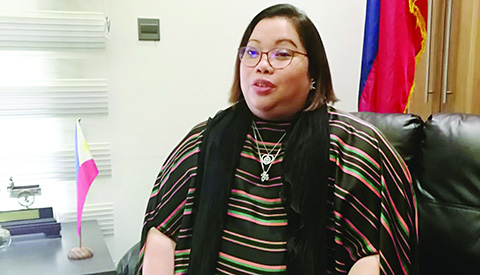 In the photo is Arriola, DFA undersecretary for migrant workers affairs
In the photo is Arriola, DFA undersecretary for migrant workers affairsKUWAIT: The Philippines will demand the maximum protection of its overseas Filipino workers (OFWs) in Kuwait, especially the interests and welfare of its domestic helpers, said a senior government official visiting the country. Speaking with the local media at the Philippines Embassy in Siddiq on Friday, Philippines Department of Foreign Affairs Undersecretary for Migrant Workers Affairs Sarah Lou Arriola said a labor 'agreement' that was signed last week was a result of initial and preliminary talks held in Manila between Kuwaiti and Filipino negotiators. "The talks were only at the level of the technical working group of negotiators. They will now go back to their principals (their governments)," she said.
"From our side, the president has expressed his views on the agreement and said the 'initial agreement signed is not enough' - he wants maximum protection for our workers. President (Rodrigo) Duterte said he wants 'government-to-government' dealings when it comes to the deployment of our workers, perhaps doing away with private recruitment agencies. The agreement initially signed was just a preliminary one - he wants more. As the chief architect of foreign policy, he wants the best for our workers," Arriola said.
According to her, negotiations will continue and will tackle all the aspects of employment - from recruitment and training to deployment and monitoring of workers once they are deployed. Arriola cited some more specific demands of Duterte - workers must be able to sleep seven continuous hours a day without interruption; and they must get decent food - no leftovers.
"Our president also acknowledged the fact that the Philippines is a poor country, but appealed to treat Filipino workers with dignity. Also, there must be standard employment contracts to be formulated by both countries. This negotiation for our workers is very important because some governments (in the Gulf) who are also receiving workers from the Philippines are also looking forward to the outcome of these negotiations.
We are hoping for a model agreement, and this is what our president wants. The negotiations are not yet over; they will continue and will take some more time before the lifting of the deployment ban. Both countries are talking, and our lines of communication are open for each other," Arriola said.
On March 16, Kuwait and the Philippines signed an agreement regulating some working conditions for domestic workers in Kuwait. The deal may end a two-month crisis sparked by reports that abuse by employers in Kuwait had driven several Filipinos to suicide. The Philippines stopped sending workers to Kuwait in January after a Filipina maid (Joana Demafelis) was found dead in a freezer, the latest incident in what Manila called a pattern of abuse committed against OFWs in Kuwait.
"The deal will ensure the rights of both employers and employees," KUNA had quoted Foreign Ministry Undersecretary for Consulate Affairs Sami Al-Hamad as saying. Hamad said the two sides agreed that domestic workers from the Philippines will have the right to retain their passports as well as the right to refuse being transferred to other employers.
Arriola thanked the Kuwaiti delegation for taking time to come to Manila to negotiate, which she said was a good sign of a treasured friendship. "We have a relationship to preserve and we are friends with Kuwait. Our previous governments did very little - if nothing at all - for our workers, no offense intended, but this time, we really have to be firm. At the moment, we need an agreement that is clear and can uphold the dignity of our workers. As to the sincerity and love for the country and his people, Duterte practices what he preaches and has this unquestionable commitment to his people and OFWs," she said.
Arriola arrived in Kuwait on Thursday to see for herself the conditions of Filipinos in Kuwait and the ongoing repatriation being done in connection with the Kuwaiti government's amnesty program. "My agency, under the DFA's Office of Migrant Workers Affairs, is in charge of mass repatriation. The Philippine government took the initiative to give all amnesty takers free plane tickets. We want to make sure that repatriation efforts are orderly conducted," she said.
"We have repatriated around 4,000 undocumented Filipinos in Kuwait. We are still waiting for the rest to come forward, as the Kuwaiti government had stated that the number of undocumented Filipinos in Kuwait is up to 10,000. We want all of them to avail of the amnesty. The president has ordered us to use DFA funds to help every Filipino who wants to go home. We are here to support the ambassador, and have deployed several people from the Philippines to help in the repatriation efforts," Arriola added.
Arriola also met some Filipino community leaders on Friday. There are more than 100 Filipino community organizations in Kuwait. Currently, there are more than 1,000 distressed runaway housemaids at the embassy's shelter, and officials have confirmed receiving an average of 20-30 workers at the shelter every day, mostly victims of various forms of physical, verbal or sexual abuse, unpaid salaries, lack of food or overwork. Kuwait is home to 250,000 Filipinos, 165,000 of them working as domestic helpers.
By Ben Garcia










